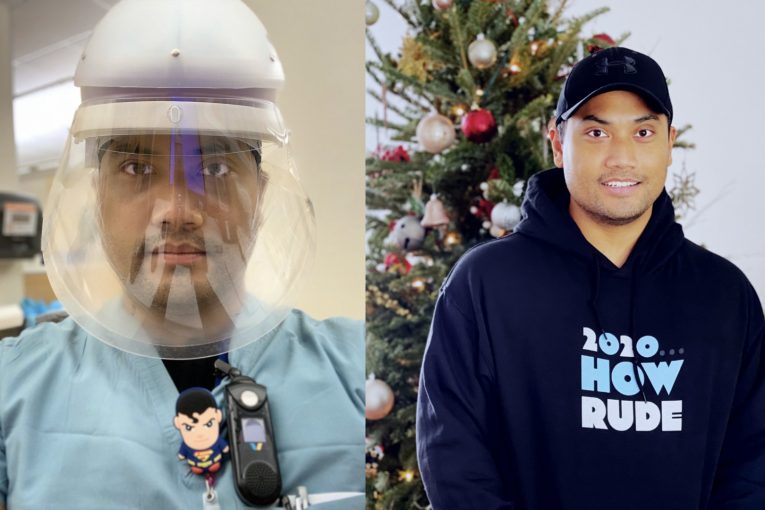

By Natasha Tieu and Cailin Garcia
ORANGE COUNTY — ICU nurse Jay Olegario is exhausted. He works in a COVID-19 unit at the Kaiser Permanente Hospital in Anaheim—and like many essential hospital staff, he’s had to deal with a slew of patients, many of whom had originally refused to adhere to CDC guidelines or take precautions against the virus. It’s a dangerous, and oftentimes thankless, task.
Southern California has been hit hard by the pandemic from the beginning. Cases in Los Angeles County, SoCal’s epicenter, continue to rise daily, with more than 1.15 million cases and 18,0000 deaths reported so far.
Just next door to LA, Orange County has its own concerning statistics, reporting 238,264 cases and 3,358 deaths to date.
Olegario, a veteran intensive care nurse, has been on the frontlines of the pandemic since March 2020 when the coronavirus first hit Southern California. Since then, he’s been working twelve hour shifts, often with no breaks, in the pandemic ICU where patients in critical condition are hooked up to ventilators.

Olegario graciously agreed to sit down with Vanguard reporters on his day off to discuss his experiences as a frontline healthcare worker during the pandemic. He hopes that his story will encourage others to take proper precautions: wearing masks, maintaining physical distancing, avoiding large gatherings, and engaging in frequent hand-washing.
He distinctly remembers the moment that his ICU unit faced the gravity of the COVID-19 pandemic. It was late March and Olegario was the charge nurse for the day when the Chief Nursing Officer and hospital directors approached him in the breakroom.
“They came up to me and said, ‘Jay, effective immediately, we are turning your unit into the COVID unit,’” he recalled. Olegario and his fellow nurses were forced to quickly adapt to the daunting situation.
In a normal situation, an ICU nurse is expected to tend to two ICU beds, or patients, per shift in order to maximize the quality of care that patients in critical condition need. The pandemic has seen nurses at the Kaiser hospital taking on 4 beds at once, double the recommended amount.
They’re also being forced to make decisions about who to prioritize for ventilators. The ICU has implemented a system based on survivability, or the likelihood that a patient will make it through treatment and go on to live a relatively healthy life afterwards. But that doesn’t make the choice easier to bear for hospital staff.
“You really don’t get to see the full depth of this pandemic until you step into a critical care unit,” said Olegario. “We’ve seen the worst of what COVID-19 can do to people.”
It’s a grim situation, with nurses often seeing 2-4 patients in the emergency care ward dying each shift—and it’s taking its toll on emergency care staff.
“I believe there’s going to be a lot of critical care nurses with PTSD when this is all done,” Olegario said. It’s a statement that echoes the sentiments of health care workers across the nation, as they deal with rising cases, and the ever upwards ticking of the death toll.
When asked how the ICU nurses in the COVID ward are coping with the high mortality rates and inundation of new patients, Olegario responded, “You don’t have time to process it because as soon as that bed is empty there’s another patient to fill it.”
What makes the whole situation even more dire though, is the fact that many of Olegario’s patients refused to wear masks or practice social distancing. That pattern of flouting CDC guidelines is causing ICU bed shortages, staff shortages, and hospital overflow. It also adds an extra layer of complications to treatment—how do you help someone who refuses to believe the virus is real?
When we broached the topic of anti-maskers, there was a sense of resignation in Olegario’s answers. “I had a lot of stress about it,” Olegario answered honestly with a laugh.
Olegario has spent a lot of time, especially at the beginning of the pandemic, using his social media platforms to counter dangerous anti-masking and virus-denying rhetoric. He encourages others to look at their masks as just “another element of their clothing.”
“Think of it like a seatbelt,” he says about masks. “It’s just another measure of protection.”
But even with his efforts to educate others, the reality for Olegario—and hospital staff across the nation—is that they’re risking their lives daily to care for patients that refuse to take basic precautions against a deadly virus. To say it’s frustrating healthcare workers is an understatement.
But the irresponsibility of their patients’ risky behavior doesn’t impact the quality of the care Olegario and his colleagues provide. Olegario is firm in his declaration: “I’ll still treat you. I’ll still take care of you. No matter what you believe.”
Despite the circumstances, Olegario remains optimistic. In the 10 months since the pandemic first hit Southern California, none of his colleagues have contracted the virus at work, due in large part to their vigilance about physical distancing, masking, and disinfecting.
In addition, Olegario is in favor of Governor Newsom’s recent initiative to reopen outdoor dining and certain small businesses in California so long as individuals adhere to masking rules and make sure to physically distance themselves.
Having received both doses of the Pfizer vaccine with minimal side effects, Olegario is even more hopeful for what the next few months will look like, especially as more and more people get vaccinated.
“I trust science. I trust clinical trials,” he said when asked if he was concerned about what the vaccine contains.
He, like most health care professionals and pandemic experts, agrees that inoculating the public will help expedite the reopening of the country.
Ultimately though, Olegario recognizes that even with the opening of California businesses over the next few months, certain COVID-born precautions will remain in place for the foreseeable future, especially masks.
“It’s going to be the new normal,” said Olegario.
Jay Olegario’s experiences and hard work as an ICU nurse is a stark reminder of the importance of maintaining physical distance and wearing masks—especially with California’s recent re-opening.
While all of us continue to cope with the effects of the pandemic on our lives, it’s important to recognize that many of us have had the privilege to do so from the comfort of our homes while frontline essential workers are forced to confront the ugly realities of the pandemic everyday.
“For us, coping is getting the work done, doing it to our fullest potential, and going home and being happy we’re still alive,” Olegario said.
 Natasha Tieu is a writer for the LA Vanguard’s Court Watch desk. She is a History and Economics double majoring at USC, originally from Palos Verdes, CA.
Natasha Tieu is a writer for the LA Vanguard’s Court Watch desk. She is a History and Economics double majoring at USC, originally from Palos Verdes, CA.
Cailin Garcia is the co-editor in chief and founder of the People’s Vanguard of Los Angeles. Originally from Santa Clarita, CA, she is currently a senior at UCLA, studying Sociology.
The People’s Vanguard of Los Angeles is launching a series of interviews with essential workers in hopes of providing a platform for them to share their stories amidst the pandemic and raise awareness of the importance of abiding by COVID-19 safety protocols. If you are an essential worker in LA who may be interested in being interviewed, please contact us at vanguardla@davisvanguard.org.
To sign up for our new newsletter – Everyday Injustice – https://tinyurl.com/yyultcf9
Support our work – to become a sustaining at $5 – $10- $25 per month hit the link: